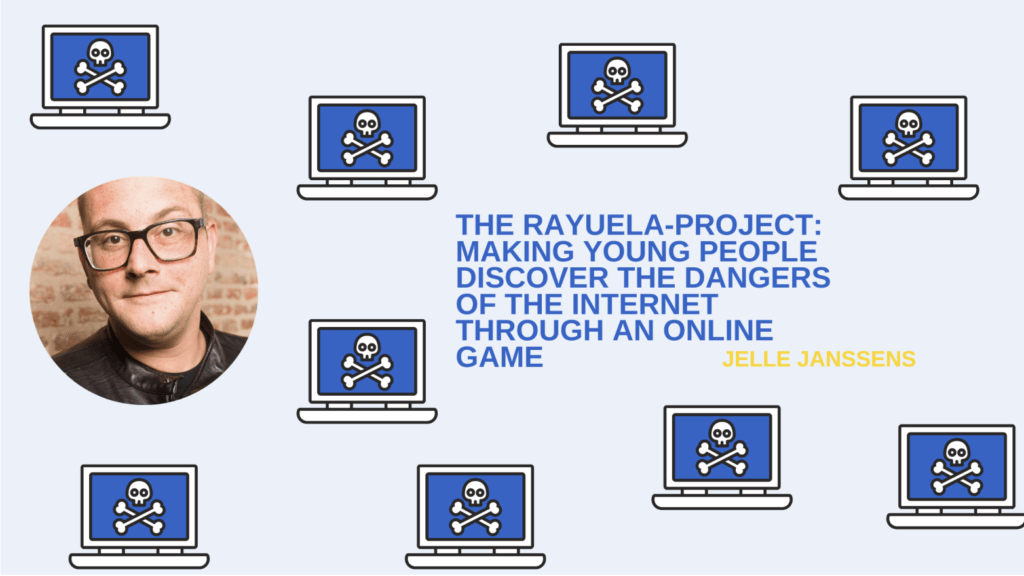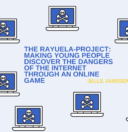The RAYUELA project: Making young people discover the dangers of the Internet through an online game
What exactly is the RAYUELA Project? It is a project that allows children and young people to learn about the risks of the Internet through an online game. The project started in October 2020 and will run until September 2023. Until then, all partners are joining forces to learn more about cybercrime among children/young people and how to ensure better crime prevention. This will be achieved by developing an easy and accessible online game for children and youth.
Concerns about cybercrime appear at the right time in Europe because more than 50% of Europeans feel insufficient or not informed about cybercrime. Besides, 86% of Europeans believe that the risk of becoming a victim of cybercrime is increasing faster and faster. As far as children/young people are concerned, half of all 11–16-year-olds have experienced one or more risks associated with the Internet, such as cyberbullying. Young people not only run the risk of becoming victims but can also (often unintentionally) become perpetrators of cybercrime, which can have serious consequences. The project will focus on the online luring of children (=online grooming), cyberbullying, and human trafficking of minors for sexual exploitation.
The project has a lot of partners, such as the Ministry of Justice, criminologists, computer scientists, and psychologists. It was important to involve different stakeholders in this project from the beginning. Moreover, working with practitioners and policymakers ensures a two-way communication between those who need to acquire knowledge and those who will use the knowledge in practice. The needs of stakeholders can thus play an important role at every stage of the project, and the results can be easily communicated.

RAYUELA draws knowledge from different fields and combines both social and exact sciences. This combination aims to try to prevent cybercrime by raising awareness among everyone. A multidisciplinary approach is necessary to tackle a multifaceted problem like cybercrime. Some of the fields in this multidisciplinary approach are:
- Psychology
- Criminology
- Anthropology
- Neurobiology
- Engineering sciences
This multidisciplinary approach will create a multilingual online game freely available in various app stores. Other educational resources will be made available through the project’s YouTube channel and social media platforms.
The project will contribute to the theoretical understanding of cybercrime, focusing on children and youth. This will partly consist of investigating the profile of both victims and offenders and the modus operandi associated with cybercrime. This will be achieved by conducting in-depth interviews and by reviewing court records. This profiling ensures the recognition of potential risks and, thus, cybercrime prevention. Later on in the project, when the children/young people will be using the online game, these profiles of both victims and offenders can be adjusted by collecting data from the game.
The in-depth interviews that will take place in the first phase are aimed at both victims, offenders and experts in the field of cybercrime. In addition to providing valuable information for the project, the identification of experts (e.g., victim organizations) creates a feedback loop. Those who know the interests of these young people are in constant contact with the project as stakeholders and can then start using the results obtained through the project in their own activity. Broad ethical considerations are taken into account when interviewing the children and young people. Their privacy is ensured in accordance with GDPR regulations. Particular consideration is given to vulnerable groups and shielding participants from potential societal and individual harms is a core concern of the project.
The project has potential policy implications at different levels. Within European policy, communication between relevant European institutions is very important and necessary. At the national level, all partners of that country are responsible for changes in the national policy. Each partner will identify their stakeholders, such as NGOs, law enforcement agencies and many others. In this way they promote the production of knowledge and locally relevant policies emerge as a result. In Belgium, the Federal Police is working on a national security plan for the period between 2021 to 2025, in which cybercrime will be a main priority. The Federal Police will also be disseminating the online game, toolkit and other developments and these, in turn, will help to raise awareness of the issue and prevent cybercrime.
The dissemination of the project’s output is not limited to academic circles, conferences and the publication of papers. In more concrete terms, a series of presentations will be given in some partner countries, along with seminars and workshops. Most importantly, the online game will be made freely available and the partners will focus on publicizing it. Another important goal of all those involved in this project is that the children/young people can be reached in a meaningful and enjoyable way so that they can gain knowledge to prevent them from ever becoming victims or perpetrators of cybercrime.
If these children/young people can enjoy gathering information about cybercrime by playing an informative online game, only then will our RAYUELA team be satisfied.
